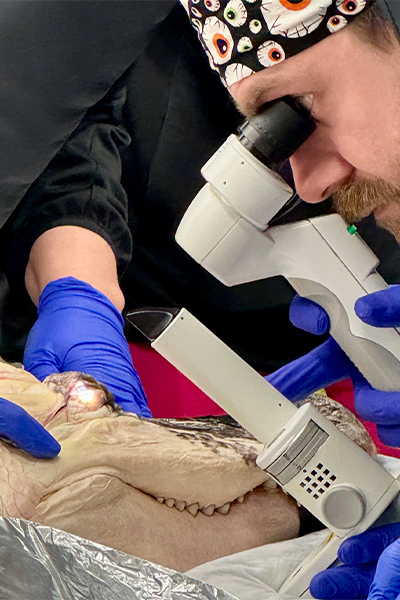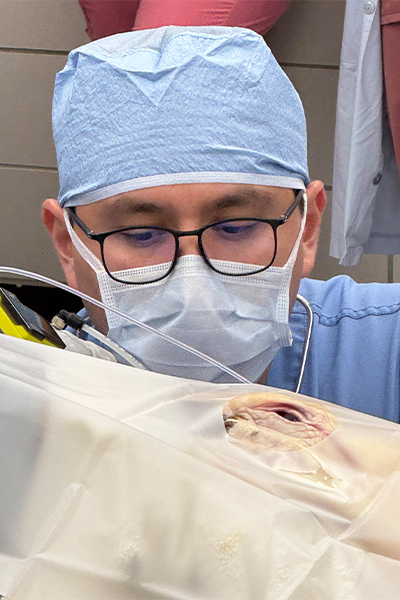Victor's Vision: Rare white alligator's vision restored in groundbreaking surgery at LSU Vet Med
March 26, 2025
There’s more to Victor, the white alligator, than meets the eye. His journey from struggling to see his food to having his vision restored in an unprecedented cataract surgery has made veterinary medicine history and improved the beloved alligator’s life.
When caretakers at the Audubon Zoo noticed that Victor, a leucistic alligator with rare white skin and deep blue eyes, could not see his dinner dangled before him, they realized something was wrong. It’s the kind of problem that could cost an alligator in the wild his life. Dr. Robert MacLean, Audubon associate veterinarian, said his colleague and LSU Vet Med alumna, Dr. Hilary Householder, called in LSU Vet Med ophthalmologist Dr. Renee Carter to examine Victor’s eyes.

Victor's white skin would cause him to stand out, and, therefore, be vulnerable in the wild.

Drs. Hannah Gafen, Renee Carter, and Pilar Camacho-Luna of LSU’s Ophthalmology prepare Victor for surgery.

Drs. Patricia Queiroz-Williams and Javier Nevarez, along with other clinicians keep Victor, stable and pain-free.

Victor’s eye is prepped and ready for the procedure.

Victor's eyes scan the surface of the water.
Dr. Carter confirmed that Victor, age 12, had an advanced cataract in his left eye with evidence of inflammation.
Leucistic alligators like Victor are rare creatures, with their pale ivory skin making them easy prey in the wild. Now, Victor is even more extraordinary—he is the first alligator known to undergo cataract surgery, a procedure that, according to Dr. Carter’s research during preparation, has never been performed in the U.S.
In February, a collaborative effort among LSU Veterinary Teaching Hospital services,
including Zoological Medicine, Ophthalmology, and Anesthesia resulted in a plan to
help Victor. Dr. Javier Nevarez led the Zoological Medicine team, Dr. Carter headed
the Ophthalmology team, and Dr. Patricia Queiroz-Williams oversaw Anesthesiology.
These services are among LSU Veterinary Medicine’s 19 specialties that work together
to provide exceptional medical care.
Following careful deliberations, Victor was transported by Audubon Zoo clinicians
under sedation to LSU Vet Med, where Drs. Nevarez, Queiroz-Williams, and Householder
faced the challenge of safely transferring him from his carrier cage for anesthesia.
Drs. Queiroz-Williams and Nevarez managed Victor while he remained sedated until he
was fully anesthetized, allowing Dr. Carter and her team to perform the complex procedure
on the alligator’s uniquely structured eye.

Dr. Denver Coleman, LSU Ophthalmology resident, helps to determine whether Victor was a good candidate for surgery.
“Their eyes are on the top part of their skulls, so when they are submerged in water, they can still see above the surface. This made it tricky to position him for surgery,” Dr. Carter explained.
The team first needed to determine if Victor was a good candidate for surgery. After performing several tests, including an ocular ultrasound and an electroretinogram (ERG), they found that his retina was functional and attached. Confident that they could improve his vision, they moved forward with the procedure.
The surgery was performed by Dr. Hannah Gafen, LSU Ophthalmology resident. She said, “While cataract surgery is typically straightforward in dogs, Victor’s case required us to adapt to the differences in his anatomy and response to medications. There were significant challenges we had to overcome.”
The surgery involved removing the cataract through phacoemulsification, a process where the lens is emulsified and removed.
Dr. Queiroz-Williams, along with Dr. Nevarez ensured Victor’s eight-foot-long body remained stable, safely under anesthesia, and pain-free throughout the operation, which took nearly two hours.
“All went very smoothly. I was so grateful for the collaborative efforts of the Audubon Zoo, LSU Zoological Medicine, and Anesthesiology, our awesome O.R. team, and, of course, the LSU Ophthalmology team,” Dr. Gafen said.

Dr. Hugo Gonzalez, Zoological Medicine resident, views the surgical site.
Victor’s clinical team not only performed the surgery but also placed a temporary fluid port to administer post-op eye drops. After a two-week recovery at the zoo’s animal hospital, Victor triumphantly returned to his enclosure, just in time for Mardi Gras, with his vision restored.
The LSU clinical team plans to publish their findings on the pioneering case.
"We are happy this surgery improves Victor's quality of life, helping him interact and experience his world in a more complete way,” Dr. Gafen said.
Back in his habitat, Victor is once again snapping up his dinner, returning to his normal behaviors.
“We wanted Victor to go back to being Victor—that makes us the happiest,” Dr. Carter said.
Curious? Ask us your questions, and we will do our best to answer them! Email [email protected].
Stay tuned for video where clinicians explain how they prepared for this groundbreaking procedure that has restored Victor’s vision.
Victor’s Origins
According to Dr. Robert MacLean at Audubon, Victor’s original hatch location is unknown. He came to Audubon Zoo in June 2019 from the Louisiana Department of Wildlife and Fisheries. They’d had him for about six years when they gave him to Audubon Zoo. “Wildlife and Fisheries contacted us to see if we would take him because of our expertise in leucistic alligator care. We were told he came from a wild nest but have no details where it was located. Historically, all of the white gators that have been found in Louisiana were found in the south Houma area, so it is very likely that is the same for this one,” Dr. MacLean said.